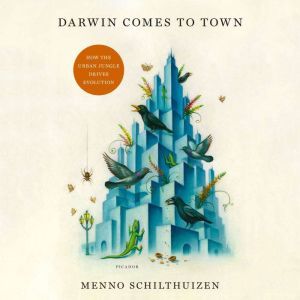Quotes
“Natural selection is occurring all around us, and, as Darwin Comes to Town explains, increasingly because of us. Menno Schilthuizen introduces us to such rapidly-evolving creatures as urban lizards and city-dwelling mice. The result is a lively and fascinating book.”
—Elizabeth Kolbert, Pulitzer Prize-winning author of The Sixth Extinction
“Not only is evolution a real thing (something that, pathetically, one still needs to point out), and not only is it an ongoing process (rather than a phenomenon of the distant past), but some of the fastest, most interesting evolving occurs right under our noses, in our cities. In Darwin Comes to Town, Menno Schilthuizen explores the ways in which animals and plants have rapidly evolved to adapt to the opportunities and exigencies of urban niches. This is a fun, witty, thoroughly informative read.”
—Robert M. Sapolsky, New York Times bestselling author of Behave: The Biology of Humans at Our Best and Worst
“In a conversational style as appealing as it is informative, Schilthuizen...explores myriad ways in which plants and animals have adapted to modern urban environments....Schilthuizen is careful throughout to distinguish between true evolutionary changes and learned behaviors passed between individuals. He also does a superb job of introducing important ecological principles along the way, leaving readers with a fascinating question: ‘Can we harness the power of urban evolution to use it to make more livable cities for the future?’”
—-Publishers Weekly *STARRED REVIEW*
“In this delightful account...readers who assume that pigeons, cockroaches, and rats are the only representatives of city biology will learn that it is far more complex.... An expert romp through urban natural history.”
—Kirkus Reviews *STARRED REVIEW*
“Darwin Comes to Town is a brilliant reproach to all the biologists who believe that their true calling is to study the ‘vanishing quantity of unspoilt nature’ — the dwindling areas of forest and wilderness little touched by human activity — and who neglect the more exciting evolutionary change taking place in the towns and cities where most of them live.”
—Clive Cookson, Financial Times
“Schilthuizen is taking on three centuries of literature and polemic that defends the virtues of rural nature against the vices of city life.... This is a spellbinding and important book.... The message is thrilling.”
—Bryan Appleyard, The Sunday Times (UK)
“An entertaining look at how wildlife is rapidly adapting to urban habitats, offering fascinating examples from across the globe.”
—Frannie Jackson, Paste Magazine “The 25 Most Anticipated Books of 2018”
“Replete with fascinating facts and written in delightfully lively prose, Schilthuizen’s work will
appeal to nature lovers and popular-science fans.”
—Carl Hays, Booklist
“While most of us are painfully aware of the negative effects that the heavy foot of progress has had on the natural world, especially in the part we call the built environment, nature refuses to go away. In fact, human activity has created a plethora of new opportunities for wildlife to survive and thrive in our presence. Darwin Comes to Town contains a wonderfully written, highly accessible collection of extraordinary examples, illustrating the breadth and depth of the concept of the ‘plasticity of adaptation’ that wildlife has demonstrated time and again, as we continue to reshape the natural world to our own requirements. It’s a great read and a real eye-opener for those who still wonder how white-tailed deer, raccoons, opossum, and a wealth of other ‘wild’ species of birds, mammals, and reptiles can carve out niches for themselves among the traffic jams and tall buildings of the modern metropolis and its suburbs.”
—Dr. Dickson Despommier, author of The Vertical Farm: Feeding the World in the 21st Century
“Darwin Comes to Town casts a radical new light on the way we should think about evolution: that it is not always a slow, lumbering process measured in millions of years, but, in fact, something that can take place at relative light speed under certain circumstances. Say, when it must adapt to the ecological pressures put on its habitat (a planet) dominated by human action, and, specifically, the frenzy of the urban landscape. Menno Schilthuizen makes an extraordinarily convincing and elegant argument that, inside the restless laboratory of the modern city, nature has already begun to adapt and engineer its own urban ecosystems. But, significantly, that it is up to us to embrace, harness, and enable these natural forces for the future.”
—Jay Kirk, author of Kingdom Under Glass
“Think our slick, hard-edged cities defy nature? In Darwin Comes to Town, the metropolis is just one more wilderness, where undeterred evolution fits ever-new forms to the cityscape, from toes to microbiomes to elaborate and beguiling new behaviors. The savage force and delicate subtlety of adaptation are engagingly unveiled in Menno Schilthuizen’s potent stories of evolution in the Anthropocene.”
—Dr. Richard Granger, Director of the Brain Engineering Lab at Dartmouth College



